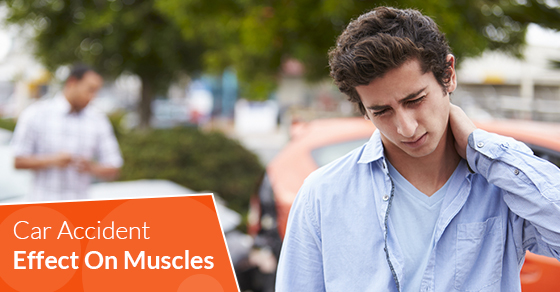The most recent statistics provided by Transport Canada show that 149,900 people suffered injuries due to vehicle traffic accidents in 2014 alone.
It is important to recognize that even the most mild of car accidents can affect your body and as such, it is important that you always seek medical attention, even if you don’t feel immediate pain. The following article will discuss all of the ways that car accidents can affect your muscles, regardless of the extent of the crash, so that in the event that you find yourself in an unfortunate accident, you will know how to take care of yourself.
How A Car Accident Affects Your Muscles
- Muscle Injury (Soft Tissue Injuries)
The most common injury you are likely to suffer from after a car accident is muscle (and ligament and tendon) injury, also known as a soft tissue injury. Examples of muscle damage include whiplash injuries to your neck (a common motor vehicle accident injury), which occur when the muscles and tendons become stretched due to sudden movements. Sudden movements cause the neck to suddenly jerk forward and backward and then snap back into position. Whiplash is particularly common in rear-end collisions.Whiplash is commonly thought of as a single injury. In reality, however, whiplash is actually a series of soft-tissue strains in the neck. It can result in stiffness of the neck (and reduced motion), sharp pain in the neck, pain and weakness in the shoulders and arms, headaches, dizziness and, in some cases, blurred vision and memory and concentration problems. Back problems can also develop, but that will be discussed below.It is also important to note that although whiplash can occur immediately following an accident, this is not always the case. It’s also common for whiplash to develop several days after being in a car accident. The problem with whiplash is that some individuals may not perceive it as particularly serious and fail to seek treatment. However, when people suffer from whiplash and do not seek treatment, this can lead to chronic neck and back pain, ultimately affecting your quality of life. - Mid-Back and Low-Back Muscle Strains
People in car accidents also commonly suffer from another type of muscle strain after a car accident in addition to neck strain. Back strain, particularly mid-back and low-back muscle strains, are yet another very common type of car-accident related injury. - Muscle Weakness
Many people suffer from herniated discs after a car accident, which can cause muscle weakness, numbness and tingling sensations, as well as arm and leg pain.As mentioned, not all injuries are immediately evident after a car accident. Some may take days, weeks (and in some cases even months) before injuries become evident. Therefore, it is extremely important that you always seek immediate medical attention after a car accident, regardless of how minor it was. - Muscle Spasms
Muscle spasms can also occur after a car accident. If you are suffering from significant neck and/or back pain, it is likely you are actually suffering from muscle spasms, which occur after the muscles have been stretched. Technically, the muscles tighten up as a way to protect you from engaging in further movement that could injure you even more. However, additional injury and damage can occur if left untreated. This overstretching of the muscle fibers also causes swelling, which leads to muscle aches.
How Physiotherapy Can Help
As we mentioned above, it is imperative to seek physiotherapy treatment immediately after being in a car accident. Your physiotherapist will recommend the best course of treatment.
Physiotherapy can help many muscle-related injuries after a car accident. In fact, it is usually one of the first lines of treatment for whiplash and muscle spasms. In the case of muscle spasms, physiotherapy restores motion in the muscles so that further damage does not occur as a result. Physiotherapy also addresses other injuries that have occurred because of a car accident and therefore restores function and addresses issues of mobility and stability.
In general, physiotherapy facilitates the recovery process after a car accident and helps with pain relief. It prevents long-term damage that can develop after a car accident, including chronic pain and migraines, allowing individuals to live pain-free lives. It can also reduce the need for surgery later in life, which is not entirely uncommon when natural wear and tear combine with the effects of a previous car accident related injury. Even if you haven’t been in a car accident recently, physiotherapy can be still beneficial for you.
Your physiotherapist will put together a treatment plan based on your particular injuries. However, it is imperative to consult your doctor first before attempting any physiotherapy treatments.
Car accidents affect in your body in ways you may not even be aware of. To reduce the extent of your injuries, immediate medical attention should be sought and physiotherapy should be considered.

